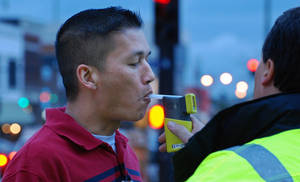Dieters could soon be able to monitor how much fat they are burning off thanks  to a portable breathalyser invented by Japanese researchers. The device measures levels of acetone
to a portable breathalyser invented by Japanese researchers. The device measures levels of acetone
on the breath, a by-product of fat metabolism. The researchers suggest that the breathalyser could be particularly useful for adjusting diet programmes for individuals, depending on how much or little fat they burn under a given diet and exercise regime. Acetone is also produced by people with diabetes, which could allow the breathalyser to help them control their sugar levels.
During fasting or prolonged exercise, the body depletes its stores of glycogen in the liver and begins to metabolise fatty acids. A by-product of fat metabolism is the production of ketone bodies, one of which is acetone, which can be detected on the breath. Now, Tsuguyoshi Toyooka and colleagues at NTT Docomo
's research laboratories in Yokosuka have invented a device capable of measuring acetone on the breath. It also takes account of other volatile compounds that can interfere with the measurement, such as ethanol, hydrogen and water vapour.
The cigarette packet-sized instrument is made up of two semiconductor gas sensors, one based on platinum-doped tungsten oxide, sensitive to acetone, and the other made from tin oxide, which detects the other volatiles to correct for potential bias. In a semiconductor sensor, the gas adsorbs to the surface and modifies the conductivity, with different formulations of the semiconductor behaving differently depending on the particular gas present.
The breathalyser contains a port into which a straw is inserted and through which breath is blown for six seconds. The results are sent to an Android-based smartphone to provide a reading. Tests on a group of subjects showed that people on a reduced food intake and taking exercise produced more acetone than those who weren't, and that the acetone levels established by the breathalyser were consistent with those measured from conventional gas chromatography. 'Our prototype can be used as a practical breath acetone checker for diet-conscious people, within an acceptable range of measurement error,' concludes the team, adding: 'It is expected that our prototype could play a pivotal role in daily diet management and will help to prevent and alleviate obesity and diabetes.'










Comments
Add a comment